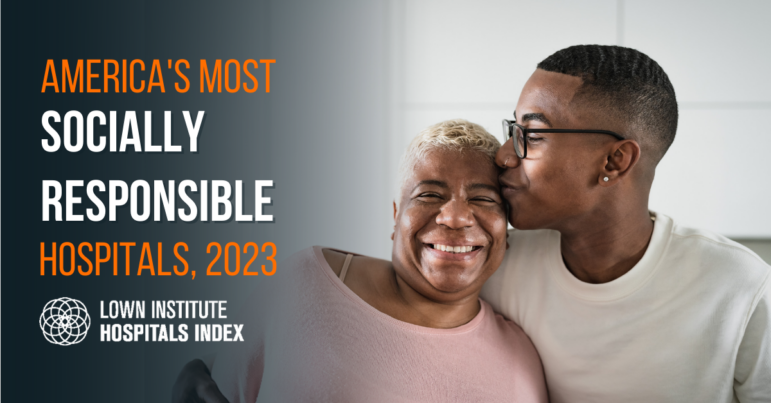Last week, we revealed our 2023 Social Responsibility ranking in a live webinar featuring Veronica Flores, CEO of Rising Communities; Read Pierce, MD, Chief Quality Officer of Denver Health; Julie Menin, New York City Council Member; and Vikas Saini, MD, president of the Lown Institute. This is the fourth year we’ve released the Index, and our dataset is larger than ever with our inclusion of Medicare Advantage data alongside traditional Medicare claims.
Over 3,600 hospitals were evaluated across the nation. Fifty-four earned A’s across the three main categories of equity, value, and outcomes, earning them Honor Roll status. To have a socially responsible healthcare system, we need more hospitals performing better on metrics like pay equity, racial inclusivity, and community investment. So how do we accomplish this goal?
See what our guest panelists said in response to some of our discussion questions at the launch event, and watch the video recording to see all of the conversation. Quotes from guests have been lightly edited for length and clarity.
On being a socially responsible hospital
Read Pierce: For Denver Health, it’s a mindset. There’s an extraordinary commitment to the people of our community, to our shared values of caring for them, and it creates a kind of North Star for us to follow. It’s also about commitment to certain values within the staff and leadership. We think of ourselves as part of an ecosystem, where we’re tightly coupled with community health centers, schools, and other community partners to work on addressing the social determinants of health. These shared values like inclusivity are anchors that pull us along.
Veronica Flores: For hospitals in Los Angeles [to be more socially responsible], I would have them focus on three main areas. First, improve ethnic representation in hospitals in terms of both providers and population. There’s evidence showing this improves outcomes and staff retention. We need to think about pipeline development, especially with the shortages we’re having right now. Second, hospitals need infrastructure to communicate with community health partners to streamline communications. Third, hospitals need to be intentional about reducing inequities, including with climate and health.
We think of ourselves as part of an ecosystem…shared values like inclusivity are anchors that pull us along.
Read Pierce, Chief Quality Officer of Denver Health
On the importance of measuring the value of care
Julie Menin: We created the Office of Healthcare Accountability because of big discrepancies in prices and no transparency…For example, some pregnant patients go to Montefiore for a c-section and end up with a $55k bill. At the city public hospital a few blocks away, the bill would be $15k.
On the importance of pay equity
Veronica Flores – Income is linked to health, so income inequality matters for health disparities…A lack of economic resources leads to stress and impacts health down the line. Workers need to be able to support their families, we need to lift them out of poverty. Increased access to resources will alleviate that and over time, improve health outcomes.
Read Pierce: When we have too much of a compensation gap, when people around the country are saying “This seems outrageous,” it subtracts from the moral energy of staff…Good performance is sustained when the pay gap between the lowest and highest salaries is actually smaller than it might be otherwise…Healthcare workers are doing critical work every day–shouldn’t we be investing in them?
On helping all hospitals achieve their social responsibility goals
Read Pierce: Hospitals face a competing set of demands in terms of who they are accountable to. Of course we want to care for the community, but how we fund care is also a key focus, along with following regulations and reporting requirements…This is where policymakers can help us find clarity among priorities. We need to work with policymakers and the local community to work on the things that are most impactful to advance the health of communities. Most importantly is that we’re in conversation with policymakers asking “How can we make this ecosystem more vibrant and stronger?” It’s hard for us in the care-delivery system to solve for the social determinants, sustainability, schools, etc. We need help to do that.
Veronica Flores: Schools are expected to prepare the next generation of students; they have very specific metrics of success. Hospitals should be expected to ensure the health of the communities they serve…[so] it’s crucial to measure equity at hospitals. Community benefits, access to care, and better health outcomes for people of color – for example, improved maternal health outcomes for Black women – these are big priorities for Los Angeles! That’s what we’d like to see hospitals doing differently; addressing these problems.
Julie Menin: Sunlight is a wonderful cure for a lot of issues. We’re trying to ensure that hospitals disclose the prices of various procedures, but we also get to the equity and community care piece as well. If you were to poll New Yorkers and say, “Did you know that some of the large nonprofit hospitals are receiving $1.2 billion in tax incentives?” I think the majority of New Yorkers would not know that information. At the end of the day, we need to make sure these hospitals are doing the right thing for their patients because the health discrepancies in many communities are tremendous.
Sunlight is a wonderful cure for a lot of issues.
Julie Menin, New York City Council Member
